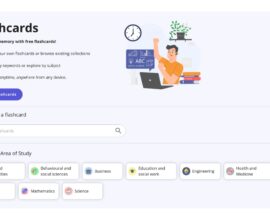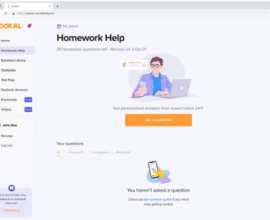The Best Study Tips From High Achieving Students
There’s always something you can do to maximise your study sessions and improve your overall academic performance! And, what better way to learn something than from those who’re already excelling at it? We asked some top-performing uni students about their success secrets, and they shared fascinating insights.
Keep reading to learn how some of our top-performing Zookal Study users approach their studies to help get the most out of their academic results:
1. Test Yourself Repeatedly
If there’s one study strategy that the best students swear by, it’s quizzing yourself. Instead of rereading your notes or a textbook chapter four or more times, try to make some practise questions after your first read-through. You can make your questions with study flashcards so you can assess your understanding of the concept repeatedly over time. You can also use the supplied chapter review questions in your textbooks.
This learning strategy is known as practise testing (or retrieval practise), and numerous research studies have shown that it improves learning and long-term retention of the material. When it comes to studying, rereading your textbook or class notes is not always the most effective way to learn the material. In fact, research has shown that students who are repeatedly tested after learning a concept actually recall significantly more information than those who simply reread the text once.
2. Repetition, Repetition, Repetition!
Revising or reviewing the same information at the right time is extremely important if you want to move it to your long-term memory. We recommend using the distributed learning strategy. After first learning a new concept or topic, return to it at regular intervals over time.
Students may usually have no trouble recalling information when it’s still fresh on their minds, but with wider gaps, it takes some effort to retrieve the information. After some spaced and repeated study of the same material, they can easily recall the information.
3. Focus on Mastery
Whenever you sit down to study, your goal should be to understand a concept as deeply as possible. Repeat a concept for as long as you need to before moving on to the next. Each student learns at their own pace, so be patient with yourself if a concept takes longer to master.
You should also try to work through the examples in your study materials to assess and solidify your understanding of the concepts you study.
If you’re trying to cram information faster, perhaps before an exam, it will be stored in your short-term memory, and you’ll forget most of it within a day or two. On the other hand, putting your focus on ‘mastering’ a concept moves it to your long term memory. Most top students recommend having a long-term learning mindset that allows you to study throughout the semester.
4. Reach Out to Your Teachers
You can utilise various resources on campus to make things easier for you. The trick is that you have to seek them out actively. For instance, unlike high school teachers, your lecturers won’t always be available to help you when you’re falling behind.
Take the initiative in your own learning, note the contact hours of your lecturers, and take full advantage of that time to seek their help. We also suggest checking out your university’s library services, where you can find further help.
5. Set Your Learning Goals Early On
The key to having an effective study time is to know exactly what you’ll accomplish during each study session. Before you sit down to study, ask yourself what you want to achieve and set a goal that supports your overall academic goals.
You can start the process of setting your study goals by checking out the lecturer’s lesson plan. The lesson plans will help you determine the objectives of every concept or topic that you’ll study. You can then write down the goal of the study session and sit down, determined to accomplish it.
6. Stick to a Study Schedule
Planning when and what you’re going to study is one of the most effective study habits you can adopt. Scheduling study time and sticking to it will help you avoid burnout. It’ll also ensure you don’t get stuck cramming all night before a big test.
You can establish a daily study routine and stick to it even when you’re not in the mood. Keep the study sessions short, take regular breaks, and after studying one subject long enough, switch to another. The more you hold yourself to a daily schedule, the more likely you’ll find yourself studying without making any excuses.
Planning study time also helps you know when to put your books down and call it a day guilt-free.
7. Maintain a Balanced Lifestyle
While your primary responsibility as a student is to study, you can’t spend every minute of your waking day buried in books. If you study for long hours without a break, you can experience more stress and have a harder time learning or retaining information.
Instead, study smarter by following your daily schedule and leave enough downtime to relax and enjoy life. You can use your downtime in any way you like – playing a musical instrument, interacting with family and friends, meditating, taking a short nature walk, watching Netflix, etc.
Balance also involves getting enough sleep each night and exercising frequently. Maintaining a balanced lifestyle will boost your mood, energy, and concentration, which come in handy when it’s time to study.
8.Try To Diversify Your Study Techniques
If you want to process information better, you can’t simply read through your notes the same way every time. The best approaches are when you’re actively engaged and retain the most information.
You can highlight key concepts, summarise the important points in your own words, and create study flashcards when learning. You can also try to teach someone else, mostly your study buddies or even an imaginary person, what you have learned to ensure you understand the concept clearly. Be sure to try out such study techniques and stick to the ones that work best for you.
9. Review New Material Within 24 Hours
Reviewing new concepts within a day or two helps to retain more of the learnings than if you did at a later date. Try to dedicate some time each evening to review your notes or the information you learned in your classes during the day.
If you keep new materials for later, you may forget most of what you learned in class, and you’ll have to relearn from scratch later.
Make it a habit to also start everything early, including assignments and exam preparation. You’ll be covered in case of unexpected events, like falling ill or power outages. It also improves your odds of doing your best at an assignment.
10. Create the Right Study Environment
Your study environment has a significant impact on your concentration and productivity. Try to designate one area for your study activities. Ideally, your study space should have a comfortable chair, desk, and enough lighting. It should also be free of distractions. If even the slightest background noise is distracting to you, go for more silent places.
Summary
Most top-performing students rely on proven study habits and strategies – like self-testing and following a daily study routine. If you want to get more out of your usual study times, improve your ability to master new concepts, and retain the information you learn, have a go with any of the study tips suggested above!
If you get stuck while studying, don’t waste more of your precious time or procrastinate! You can always use the Zookal homework help tool to get assistance from expert tutors 24/7. For more tips on how you can study effectively, check out our resourceful blog!





